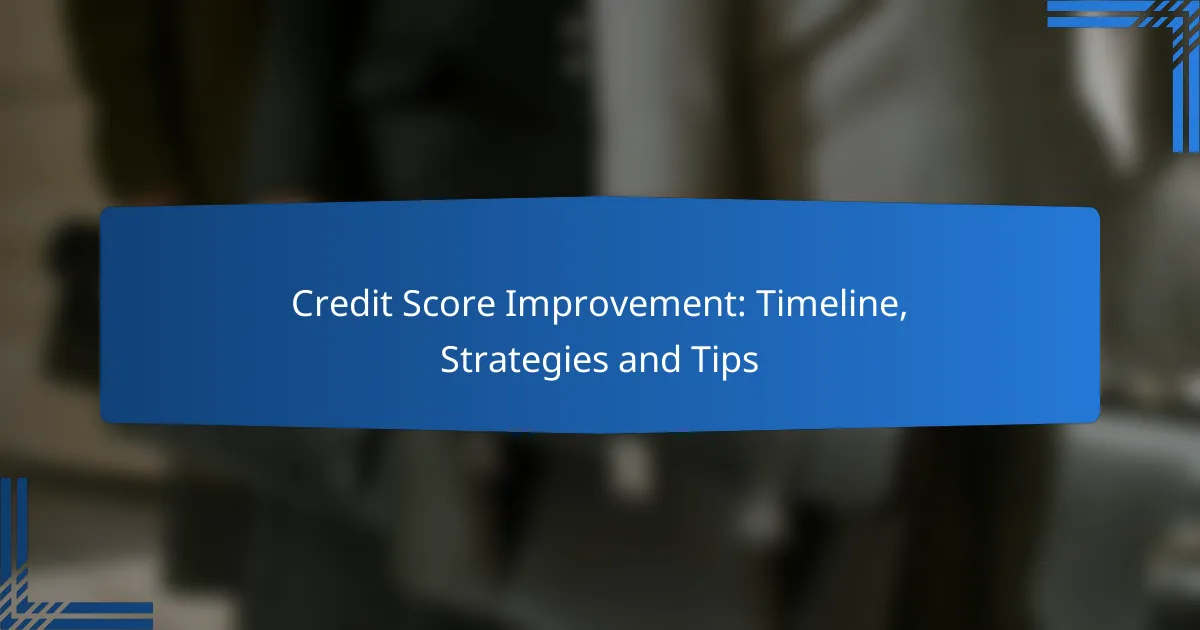Improving your credit score is a vital step towards enhancing your financial health and securing better lending opportunities. By implementing effective strategies such as timely payments, managing credit utilization, and monitoring your credit report, you can see improvements that may take weeks to months, depending on your individual circumstances. Understanding the factors that influence your credit score is essential for making informed decisions and achieving your financial goals.

What are the best strategies for improving credit scores in the UK?
Improving credit scores in the UK involves several key strategies that can enhance your financial standing. By focusing on timely payments, managing credit utilization, and regularly monitoring your credit report, you can significantly boost your creditworthiness over time.
Pay bills on time
Paying your bills on time is one of the most effective ways to improve your credit score. Late payments can remain on your credit report for up to six years, negatively impacting your score. Setting up direct debits or reminders can help ensure you never miss a payment.
Consider prioritizing bills that report to credit agencies, such as credit cards and loans. Consistent on-time payments can demonstrate reliability to lenders, which is crucial for credit score improvement.
Reduce credit utilization
Credit utilization refers to the ratio of your current credit card balances to your credit limits. Keeping this ratio below 30% is generally recommended for a healthy credit score. For example, if you have a total credit limit of £10,000, aim to keep your balances under £3,000.
To reduce utilization, pay down existing balances and avoid accumulating new debt. Increasing your credit limits can also help, but be cautious not to increase spending as a result.
Check credit reports regularly
Regularly checking your credit reports is essential for identifying errors and understanding your credit standing. In the UK, you can access your credit report for free from agencies like Experian, Equifax, and TransUnion. Look for inaccuracies or outdated information that could be dragging your score down.
If you find errors, dispute them promptly with the credit reference agency. Keeping your credit report accurate can help maintain or improve your credit score over time.
Limit new credit applications
Each time you apply for credit, a hard inquiry is made on your report, which can temporarily lower your score. Limiting new credit applications can help you avoid unnecessary dips in your score. Only apply for credit when you truly need it.
Consider checking your eligibility for products before applying, as this often involves a soft inquiry that does not affect your score. This approach allows you to gauge your chances of approval without the risk of a hard inquiry.
Consider credit-building products
Credit-building products, such as secured credit cards or credit-builder loans, can help improve your credit score if used responsibly. These products are designed for individuals with limited credit history or those looking to rebuild their scores.
When choosing a credit-building product, look for options with low fees and favorable terms. Make sure to use them wisely by making small purchases and paying off the balance in full each month to establish a positive payment history.

How long does it take to improve a credit score?
Improving a credit score can take anywhere from a few weeks to several months, depending on the strategies employed and the individual’s credit history. Immediate changes may be seen through specific actions, while long-term improvements require consistent effort over time.
Immediate improvements possible
Certain actions can lead to quick enhancements in your credit score. For example, paying down credit card balances can significantly reduce your credit utilization ratio, which is a key factor in scoring models. Additionally, disputing inaccuracies on your credit report can yield immediate results if the errors are corrected.
Other immediate strategies include becoming an authorized user on a responsible person’s credit card or making timely payments on existing debts. These actions can help boost your score within a matter of weeks.
Long-term strategies take months
Long-term strategies for improving your credit score typically require several months of consistent effort. Establishing a solid payment history by making on-time payments over time is crucial, as payment history accounts for a significant portion of your credit score. This process can take six months to a year to see substantial changes.
Additionally, maintaining low credit utilization and avoiding new hard inquiries can help build a stronger credit profile. It’s advisable to keep old credit accounts open to lengthen your credit history, as this can positively impact your score over time. Regularly monitoring your credit report for errors and addressing them promptly is also essential for sustained improvement.

What factors affect credit scores in the UK?
In the UK, several key factors influence credit scores, which are essential for determining creditworthiness. Understanding these elements can help individuals improve their scores and secure better financial opportunities.
Payment history
Payment history is the most significant factor affecting credit scores. It reflects whether you have paid your bills on time, including credit cards, loans, and utility bills. Consistent on-time payments can positively impact your score, while missed or late payments can severely damage it.
To maintain a good payment history, set up reminders or automatic payments for your bills. Avoid defaulting on any loans, as defaults can remain on your credit report for several years.
Credit utilization ratio
The credit utilization ratio measures how much of your available credit you are using. A lower ratio indicates better credit management and can positively influence your credit score. Aim to keep your utilization below 30% of your total available credit.
For example, if you have a credit limit of £10,000, try to keep your outstanding balance below £3,000. Paying down existing balances and requesting higher credit limits can help improve this ratio.
Length of credit history
The length of your credit history accounts for how long your credit accounts have been active. A longer credit history generally reflects more experience with managing credit, which can enhance your score. Lenders prefer borrowers with established credit histories.
To improve your credit history length, avoid closing old accounts, even if you no longer use them. Keeping these accounts open can help maintain a longer average credit history.
Types of credit accounts
Having a mix of credit accounts, such as credit cards, personal loans, and mortgages, can positively affect your credit score. This diversity shows lenders that you can manage different types of credit responsibly.
However, only take on credit that you need and can manage. Opening too many accounts in a short period can lead to confusion and potential financial strain.
Recent credit inquiries
Recent credit inquiries occur when lenders check your credit report to assess your creditworthiness. Multiple inquiries within a short timeframe can signal risk to lenders and may lower your score. It’s advisable to limit applications for new credit.
When shopping for loans, try to make all inquiries within a short period, as they may be treated as a single inquiry. This approach minimizes the impact on your credit score while allowing you to compare offers effectively.

What are the common mistakes to avoid when improving credit scores?
To effectively improve credit scores, it’s crucial to avoid certain common mistakes that can hinder progress. Key pitfalls include missing payments, maxing out credit cards, and closing old accounts, all of which can negatively impact your credit profile.
Missing payments
Missing payments is one of the most detrimental mistakes you can make regarding your credit score. Payment history accounts for a significant portion of your credit score calculation, so even a single late payment can cause a noticeable drop. Aim to pay all bills on time, and consider setting up automatic payments or reminders to help manage due dates.
If you do miss a payment, try to make it up as soon as possible. Late payments can remain on your credit report for up to seven years, but their impact lessens over time. Staying current on future payments is essential to rebuilding your score.
Maxing out credit cards
Maxing out credit cards can severely damage your credit utilization ratio, which is a key factor in your credit score. Ideally, you should keep your credit utilization below 30% of your total available credit. For example, if you have a credit limit of $10,000, try to maintain a balance of no more than $3,000.
To improve your credit score, pay down existing balances and avoid charging more than you can afford to pay off each month. If possible, request a credit limit increase to lower your utilization ratio without increasing your spending.
Closing old accounts
Closing old accounts can negatively affect your credit score by reducing your overall credit history length and increasing your credit utilization ratio. Older accounts contribute positively to your credit profile, so it’s generally advisable to keep them open, even if you don’t use them regularly.
If you must close an account, consider closing newer accounts first. Monitor your credit report to ensure that your credit utilization remains healthy and that you maintain a diverse mix of credit types, which can also help improve your score.

What tools can help with credit score improvement?
Several tools can assist in improving your credit score by providing insights, tracking changes, and offering personalized strategies. Utilizing these resources can help you understand your credit profile and take actionable steps towards enhancement.
Experian Credit Score Tracker
The Experian Credit Score Tracker is a tool that allows users to monitor their credit scores in real-time. It provides access to your Experian credit report and alerts you to any significant changes, helping you stay informed about factors affecting your score.
With Experian, you can also receive personalized tips based on your credit profile. For example, if you have high credit utilization, the tool may suggest strategies to lower your balances, which can positively impact your score.
Be aware that while the basic tracking service is free, there may be premium features available for a fee. Always evaluate whether the additional features align with your credit improvement goals.
ClearScore
ClearScore is another valuable tool that provides free access to your credit score and report from multiple credit bureaus. It offers insights into your credit history and suggests ways to improve your score based on your financial behavior.
ClearScore also features a user-friendly interface that highlights key areas for improvement, such as payment history and credit utilization. Users can benefit from tailored recommendations, which can help them make informed decisions about credit management.
Additionally, ClearScore may provide access to credit card and loan offers that are more likely to be approved based on your credit profile. This feature can help you find suitable financial products while working on your credit score.
